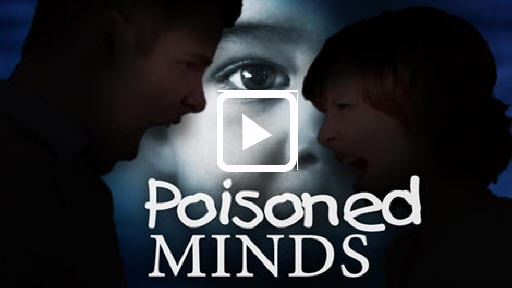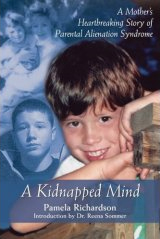
Parental 'poison' of kids on rise
The Age, Australia, February 6, 2012
MORE warring parents in Family Court disputes are claiming former partners have poisoned their children against them, a new study shows.
It reveals fathers are almost as likely as mothers to be guilty of deliberately alienating the children from the other parent.
Nicholas Bala, professor of law at Queens University in Canada and an expert in parental alienation, will present his findings of Australian data at a seminar in Melbourne this month at the Australian Institute of Family Studies.
He said there were genuine cases of parental alienation - where children were brainwashed and manipulated into an unfounded fear and rejection of the other parent.
''But there are other cases where the child has legitimate reasons to be afraid of a parent,'' he said, ''and it's important for the court to unpack the real reasons.''
The study found that where a parent was found to have alienated the child from the other parent, judges ordered the child live with the ''rejected'' parent in half the cases.Read More..

Parental Alienation: A Mental Diagnosis?
Some experts say the extreme hatred some kids feel toward a parent in a divorce is a mental illness
U.S. News & World Report, By Lindsay Lyon, October 29, 2009
From an early age, Anne was taught by her mother to fear her father. Behind his back, her mom warned that he was unpredictable and dangerous; any time he'd invite her to do anything-a walk in the woods, a trip to the art store-she would craft an excuse not to go. "I was under the impression that he was crazy, that at any moment he could just pop and do something violent to hurt me," says Anne, who prefers that only her middle name be used to guard her family's privacy. Typical of a phenomenon some mental-health experts now label "parental alienation," her view of him became so negative, she says, that her mother persuaded her to lie during a custody hearing when the couple divorced. Then 14, she told the judge that her dad was physically abusive. Was he? "No," she says. "But I was convinced that he would [be]." After her mother won custody, Anne all but severed contact with her father for years.
If a growing faction of the mental-health community has its way, Anne's experience will one day soon be an actual diagnosis. The concept of parental alienation, which is highly controversial, is being described as one in which children strongly attach to one parent and reject the other in the false belief that he or she is bad or dangerous. "It's heartbreaking," says William Bernet, a child and adolescent psychiatrist and professor at Vanderbilt University School of Medicine, "to have your 10-year-old suddenly, in a matter of weeks, go from loving you and hiking with you...to saying you're a horrible, ugly person." These aren't kids who simply prefer one parent over the other, he says. That's normal. These kids doggedly resist contact with a parent, sometimes permanently, out of an irrational hate or fear. Read More..
![]()
Canada's largest daily newspaper
1 divorce: 54 hearings, 5 judges, $200,000
The Toronto Star, (Canada's largest daily newspaper), by Susan Pigg, Living Reporter, May 08, 2009
Gloria Lewis finally worked up the courage to leave her abusive husband six years ago and thought she and her two young children would be well on their way to a new life within six months.
But next week she heads to court for the 54th time and will appear before the fifth judge to handle the couple's divorce proceedings, having spent more than $200,000 in legal fees and amassed four boxes of legal documents. She spends her days working for "the greatest boss in the world" and her nights researching case law for her busy lawyer as a way of trying to keep a lid on her mounting divorce tab.
Today Lewis, who earns less than $40,000 a year, is preparing for another stint before a judge, wondering if anyone will ever put an end to what she terms "legal bullying" by her ex-husband. The biggest issue that has eaten up her savings and keeps her awake most nights: How much do kids have to see a father they fear, and will the visits be closely supervised? Read More..
![]()
That toxic tug-of-war
In a custody battle, making peace is more important than being right. Indeed, the very notion of 'parental alienation' glosses over whose rights are at issue - namely, the child's
The Globe and Mail, Globe essay by Justice Harvey Brownstone, April 24, 2009
Several recent court cases have focused on the serious problem of parental alienation. Although many are hearing about it for the first time, it has always been a prevalent concern in high-conflict custody litigation.
Mental-health professionals debate the definition of parental alienation, and whether it is a clinical "syndrome," but few would disagree that the problem exists. In simple terms, "parental alienation" refers to a parent's persistent campaign of denigrating the other parent to their child (sometimes called "brainwashing" or "poisoning" the child against the other parent), which causes the child to unjustifiably reject the other parent.
Alienating conduct can take many forms: badmouthing the other parent's personality and conduct; portraying the other parent as dangerous, abusive or as having abandoned or not loving the child; withdrawing love and affection from a child who expresses positive feelings about the other parent; and denying the other parent contact with the child. While some mean by "parental alienation" only the misconduct of custodial parents, we judges often see high-conflict cases where both parents badmouth each other to the children, cruelly placing them in conflicts of loyalty. Moreover, such conduct is not in the exclusive domain of mothers or fathers; both engage in it. Read More..
![]()
FAMILY LAW
Parental alienation cases draining court resources
Study says such cases should be moved out of court system, handled by individual judges
The Globe and Mail, by KIRK MAKIN, JUSTICE REPORTER, May 13, 2009
An escalation in parental alienation allegations is draining valuable courtroom resources, a major study of 145 alienation cases between 1989-2008 concludes.
"Access problems and alienation cases - especially those which are more severe - take up a disproportionate amount of judicial time and energy," said the study, conducted by Queen's University law professor Nicholas Bala, a respected family law expert.
"One can ask whether the courts should even be trying to deal with these very challenging cases." Read More..
![]()
Custody judges rule on vengeance
Courts criticized for recognizing 'parental alienation'
National Post, ( Canada's 2nd largest national daily newspaper), by Kathryn Blaze Carlson, Friday, March 27, 2009
Toronto -- The scope of the courts' reach into family affairs has long been contentious, but a recent trend in Canada's legal system has brought a new controversy that has some onlookers praising judges and others condemning them for accepting what they call "voodoo science."
More than ever before, Canada's judges are recognizing that some children of divorced and warring parents are not simply living an unfortunate predicament, but rather are victims of child abuse and suffering from Parental Alienation Syndrome. Read More..
![]()
Gender bias evident in parental alienation cases
Mothers are more likely to be the parent behind children's estrangement, yet fathers more often ordered into counselling, study finds
The Globe and Mail, Canada's largest national newspaper, by KIRK MAKIN, Justice Reporter, Saturday, March 28, 2009
JUSTICE REPORTER - A study of alienated children has found that mothers were significantly more likely to be the parent who emotionally poisoned their children than were fathers.
Toronto family lawyer Gene Colman told a Toronto symposium yesterday that of 74 court rulings that found parental alienation since 1987, the mother was the alienator in 50 cases. The father was the alienating parent in 24.
"I'm not trying to dump on moms," Mr. Colman told about 150 psychologists, family lawyers, mediators and activist parents. "I'm just saying, that is what the data reveal."
In parental alienation syndrome, an estranged parent systematically brainwashes a child into hating the other parent. The profile of the syndrome escalated over the past year, after three Ontario judges ordered that children be removed from an alienating parent and taken to U.S. clinics for deprogramming therapy.
Mr. Colman said that alienating fathers were twice as likely to be ordered to undergo counselling as were mothers in alienation cases - a finding that raises serious questions about whether judges are exhibiting gender biases. Read More..
![]()
PSYCHOLOGY: MIND GAMES
The family Pandora's Box
Some victims of parental alienation syndrome don't realize until adulthood that one parent turned them against the other
The Globe and Mail, by Tralee Pearce, March 24, 2009
After Joe Rabiega's parents divorced, when he was an adolescent, his father repeatedly told him his mother had abandoned him. The boy had to return any gifts that came from his mother's side of the family and, twice daily, he had to pledge his allegiance to his father.
"I was never allowed to have anything to do with her," he says from his home in Raleigh, N.C. "The consequences were dire if I did. He said I would have nobody."
Even though Mr. Rabiega, now 33, had witnessed ugly behaviour by his father toward his mother and knew his dad to be an erratic alcoholic, it wasn't until he sought counselling for personal problems in his early 20s that his past snapped into focus: He had been the victim of parental alienation syndrome - his father had systematically turned him against his mother.
The phenomenon, coined by psychiatrist Richard A. Gardner in 1985, has gained traction recently due to a number of recent high-profile divorce cases in Canada - not to mention the very public case of movie star Alec Baldwin, who accused his former wife, Kim Basinger, of parental alienation. Read More..
![]()
Canada's largest daily newspaper
How to deal with 'toxic' parents
Courts ill-equipped to handle parental alienation, leaving children at greater risk of emotional damage
The Toronto Star, Susan Pigg, LIVING REPORTER, March 14, 2009
When Toronto lawyer Brian Ludmer speaks about the suffering caused by parental alienation, the words come from his head and his heart.
He's seen the devastation of a mother's orchestrated campaign to make her children hate their father, or how a dad can use a 4-year-old as a weapon against his mother in the ugly aftermath of divorce. Read More..
![]()
Flouting custody orders to cost mother $35,000
The Globe and Mail, KIRK MAKIN, JUSTICE REPORTER, April 3, 2009
You can read the Court's reasons for judgment
A 42-year-old Toronto mother has been fined more than $35,000 for systematically alienating her three daughters from their father after the couple's marriage broke down.
In making the unusually harsh ruling, Madam Justice Faye McWatt of the Ontario Superior Court said that the woman - a chiropodist identified only as K.D. - blithely flouted a series of court orders aimed at restoring her children's relationship with their father.
"The respondent came to this court time and time again and consented to orders in question," Judge McWatt said. "Once she left this building, she ignored the orders, believing that she could escape scrutiny. The evidence of her contempts is overwhelming."
The ruling was the second stage of a decision Judge McWatt started last year when she ordered that the three girls be seized, sent to a parental alienation centre in the United States for deprogramming and prevented from communicating with their mother.
The children - aged 14, 11 and 9 - now live in the sole custody of their father.
"At the end of the day this was a case about a parent who did not care about what was best for her children," the father's lawyer, Harold Niman, said in an interview yesterday. "The contempt findings and penalties will hopefully make it clear to other like-minded parents that orders are to be taken seriously - and there are consequences to those parents who ignore them." Read More..
Family Advocate, Winter, 1993
When You Suspect the Worst
Bad-faith relocation, fabricated child sexual, abuse and parental alienation
by Carol Holstein Sanders
You have analyzed a father's case for custody and decided to take the case. Your preliminary investigation shows that the father is an emotionally and financially stable individual. He was more involved than the mother in the care of the children before the separation. You have given him your best advice about measures he should take to strengthen the case during the pendency of the action, but now you are faced with one of three scenarios:
- You receive a frantic call from your client who has discovered that the mother has immediate plans to move to another state with the child. The mother has refused to provide information about why and where she will move.
- You receive a call from the local protective services agency advising you that the mother has filed a report accusing the father of child sexual abuse.
- Your client calls to report that the child is suddenly being disrespectful and is making derogatory remarks to him. The remarks are inaccurate and pertain to matters the child could have heard only from the mother.
Your routine custody case has just become every family lawyer's nightmare! You must understand the dynamics of these scenarios and the best strategies to turn them to your advantage. Delay will be the death knell of your case.
Before taking action, make sure that your client is not the problem. In some situations, a client conference may be enough to satisfy your ethical and moral obligation. Witness interviews may be necessary. In serious and complicated situations, an independent psychological evaluation or polygraph may be warranted. Once you are satisfied that the mother is the culprit, take immediate steps to disarm her and preserve your client's chances of attaining custody.
A mother who wants to rob a father of his relationship with the child frequently resorts to bad-faith relocation, fabricated child sexual abuse, and/or parental alienation. Although these ploys may seem different, they are strikingly similar in that the father is set up to appear to be the malevolent parent. If the parents are otherwise equal, the father can win the custody case by proving the mother's malevolence.
Proof is difficult, however, because of the subjective and subconscious nature of the mother's motivations. It is essential that you recognize that the mother is especially formidable because her vindictiveness is often unconscious or subconscious. She can be expected to be believable because she may not recognize the inappropriate nature of her own actions. Conscious or subconscious, the manipulation is harmful; it also is assessable and provable through expert and lay witnesses. Read More..
![]()
JUSTICE / 'IT IS DIFFICULT TO CONCEIVE OF A MORE VICIOUS ATTACK'
Blameless father a victim in brainwashing case
Judge lets mother move child away, but condemns her tactics in denying father access
The Globe and mail, by KIRK MAKIN, JUSTICE REPORTER, May 19, 2009
The family law system has failed Ayman Al-Taher, leaving him just one sustaining force as he battles for his severely alienated daughter: his faith.
A Muslim chaplain at Toronto's Hospital for Sick Children, Mr. Al-Taher's last hope of seeing his 10-year-old child Ihsan slipped away last week, after Ontario Superior Court Judge Leonard Ricchetti permitted her mother to move their daughter to Saudi Arabia.
Mr. Justice Ricchetti expressed frustration that Tasnim Elwan beat the system by flagrantly violating court orders, spiriting Ihsan out of the country, and taking every measure possible to keep them apart.
Mr. Al-Taher is blameless, Judge Ricchetti said. Nonetheless, he said Ihsan has been so thoroughly alienated that granting her father any form of access would be harmful to her. Read More..
![]()
Success, in contempt
Globe Editorial
The Globe and Mail ( Canada's largest national daily newspaper ), 20 May 2009,
Family courts are not supposed to reward abusive parents, and punish parents who play by the rules. They are not supposed to allow an abusive parent to nullify the responsible parent's role in a child's life. But that is exactly what an Ontario court has done in a case of parental alienation. It has, in effect, disposed of the child's father, perhaps permanently.
Tasnim Elwan has been given permission to take her nine-year-old girl from Canada to Saudi Arabia, where she will have "a seven-bedroom home with two nannies," thanks to Ms. Elwan's wealthy new spouse. The nine-year-old hates her father because he abandoned her - or so she thinks. When he managed, with the RCMP's help, to trace her to Saudi Arabia after her mother in effect kidnapped her, and made his way to that country for 10 days, he was permitted just 15 minutes with her. Some abandonment. And now he is to be allowed one telephone call a month, which the judge doesn't expect Ms. Elwan will allow, anyway.
Ms. Elwan makes no secret of her disgust with her former spouse, Ayman Al-Taher, a chaplain at Mount Sinai Hospital in Toronto. She calls him a mentally disturbed supporter of Hamas and al-Qaeda. If those accusations were true, asked Mr. Justice Leonard Ricchetti, why then did she agree, in a formal, court- approved settlement, to allow him any access to their daughter? And why, he asked, make that settlement if she never intended to comply with its terms? (She was found in contempt of court for taking her child to Saudi Arabia.) Read More..













